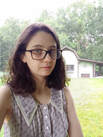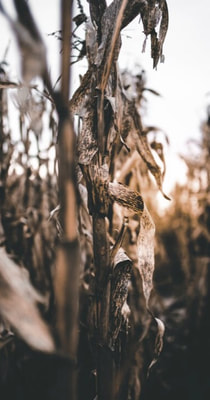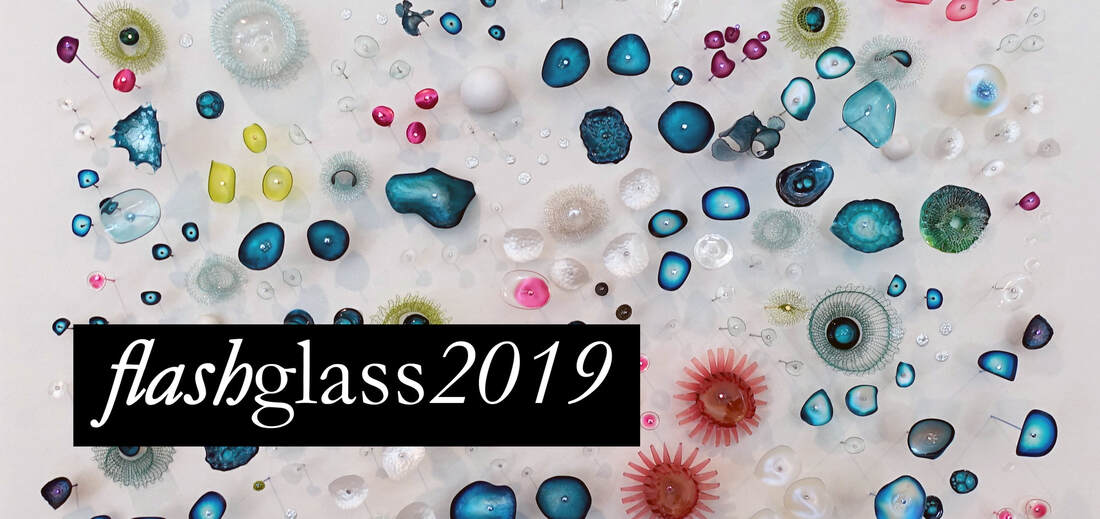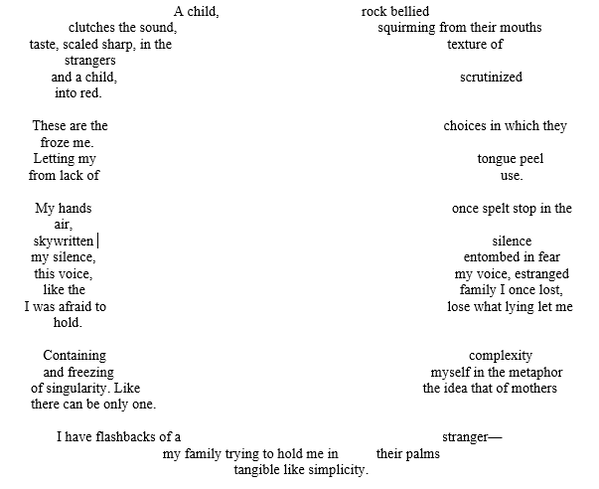|
Then there’s the time I went to Books and Books in Coral Gables to see Howard Nemerov, and though I can’t remember anything he read—either it wasn’t memorable, or my memory is on the loose in someone else’s mind—I remember the wine & cheese afterward upstairs where I expected Jacob Marley or Boris Karloff to emerge from the bookshelves. Anyway, I walk up to Nemerov with a plastic cup of wine and a paper plate of cheese chunks and tell him I loved his reading-- which was a lie—I said Mr. Nemerov—I thought the Mr. was appropriate out of respect though I learned later from a friend that the old coot had been grabbing the asses of half the women at the reading, but it was Mr. Nemerov, and I told him I had a horrible job selling messages-on-hold to telephone companies that sold telephone systems and earned fifty-thousand dollars a year, which was pretty hot shit, especially back then, especially for a guy like me, no college, no trade, just a high school diploma, and I said Mr. Nemerov, should I quit my job and concentrate on poetry? He leaned forward like a lumbering Dean Martin with his bloodshot eyes and alcohol breath, and just looked at me like I was a fucking idiot. Lenny DellaRocca is founder and co-publisher of South Florida Poetry Journal - SoFloPoJo.
0 Comments
I. Atoms and words combine themselves into complex structures: molecules and sentences, poems and beings. These pieces hold a limited amount of meaning alone, but it is only through the interconnected relationships of these base elements that they can ever become alive. To break apart these structures is to kneel before a pile of discrete pieces of information. A cell is defined by its purpose for the body as a whole, a word by the body of work. There is value in the syntax, the order, the configuration. Rearrange the elements and the whole thing may fall apart. II. Language evolves. As time goes on, a combination of sounds mutates into something that doesn’t resemble itself anymore. Every time a sequence is copied, it brings the threat (or blessing) of alteration. Without this swerve, every product created by nature or poet would be a mere copy of the original. III. A good poem already exists. The writer can imitate it, ensuring that she never rises above her predecessors and lives her life a parrot. She can rebel against it, at the risk of estranging her readers and defining her work by spite. Or she can take that work and distort it slightly, expand the boundaries to her advantage, test the limits without going too far off the edge. Nature works the same way; she is a fine poet. IV. Poems adapt to the fitness of their environment. As language evolves, the values of art must shift as well, else they will become extinct due to the meager supply of fitting words. The ideal poetic line is a genome, manipulated by entropy until an infinite series of variables miraculously synchronize with its surroundings, and it thrives. It’s hard to watch old words die. They don’t represent the language of the listeners anymore, but they preserve the language of the writers. Leave them behind when history turns its page. They will be fine. V. Poetry is a ring species. It is tempting to categorize history into eras. A segment of time is defined by one concept, and then in one single strike of the clock is defined by another. The division of history into Renaissance and Shakespearean and Romantic erases the links in between that hold them together. Change is a gradual process. The process isn’t over yet. Every individual moment is an era, defined by itself. VI. Think about the music of the spheres. The universal symphony is never over; as one tune ends, an elided cadence begins a new melody, recombining the same notes into an impossible number of variations. The last line of one poem is the opening to another. As long as art continues, it can’t really fail; even a poor piece of writing or a mislaid tune may serve as inspiration for the next. The only mistake is to stop creating. Everything finds its natural place in the end.  Audrey Dubois is a Rhode Island poet and creative writing graduate student at Emerson College. She likes weird antiques, frozen yogurt, and PBS documentaries about Karen Carpenter. You can find her on social media as @platypusinplaid  with two lines after Ursula K. Le Guin’s "The Left Hand of Darkness" Now nameless I will go seek my death. I enter as the rest have, bumping into those around me, randomly, entropic. But this is no closed system. Faced with two choices, I decide left. The path is narrow, cold. A dead end-- I see myself, the self I was when I was eight, running from mother, her chasing me through the stalks with a bottle of medicine, telling me with her hinting southern voice darling this’ll help you let me blow your nose you have a fever-- I double back, take the right, and for hours (or else, weeks, my beard thickens with each frozen step), I wander through the dark maze. When hungry, I shuck an ear of raw corn, drop to my knees and sink my teeth-- There’s a long straight hall (if one can call a row of barren field between stalks of decaying corn a hall) with no turns. The corn here wilts, limp as a cow’s utters. Too thick for water to reach. Dirt is dust. I delve further-- An open area, the size of my first apartment. Myself, now nineteen, stampedes into where the living room would be. I am master-fate, I am minotaur-breath, I am become death, destroyer of plastered walls. My fist meets white barrier-- My own footsteps, missteps, places I was lost, couldn’t find my way out. I’m eleven and I push my brother down the stairs, I’m walking through desolate streets with Patrick at four a.m., I can’t breathe. I try, find-swallow empty words-- In another dead end, I see my first dog, Binky, named because I was an infant, obsessed. I follow her through mindless turns of the maze, she pleads with me Where have you been why aren’t you here I protected you I protected you I-- There’s my father, from what I remember. He sips a beer, I’m seven, I ask him for a taste. He looks to see my mother isn’t around, says we’re all dead ends. We who kill ourselves dwell here. I grip the glass and open wide-- Corn grows stale. Each day I chart the stars from within the maze, a makeshift sextant borne of corn stalks, try to get a sense of direction. I remember being seven, hiding from my aunt between soft rolls of clothes. She calls my name-- Winter enters the maze. I wear a coat of corn, my hair married to icicles. I see my grandfather Christmas morning. I got a camera that year, it was the last time I saw him. He whistles a tune with no rhythm, he calls me Jimster I called him-- It’s been years. I forget my name, shrug it off like so many coats. Each turn feels familiar. I unexist, I’ve always been here. Find me there, muttering incoherencies to myself, beard sticky with corn juice, running into each solitary dead end-- Jimmy Hollenbeck is a graduate student/assistant at Central Michigan University, currently working in their writing center. His hobbies include brewing beer, reading comic books well past the typical age, and listening to jazz and pretending he understands it. He hopes to graduate in December 2019 with his M.A. in creative writing and to pursue an M.F.A. following that.
Cori Bratby-Rudd is a queer LA-based writer. She graduated Cum Laude from UCLA’s Gender Studies department, and is a current MFA Candidate in Creative Writing at California Institute of the Arts. Cori enjoys incorporating themes of emotional healing and social justice into her works. She has been published in Ms. Magazine, The Gordian Review, Califragile, and PANK Magazine, among others. She recently won the Editorial Choice Award for her research paper in Audeamus Academic Journal and was nominated as one of Lambda Literary's 2018 Emerging Writers.
|
FLASH GLASS: A MONTHLY PUBLICATION OF FLASH FICTION, PROSE POETRY, & MICRO ESSAYSCategories
All
Cover Image: "A Peaceful Coexistence Part II"
|
|
Glassworks is a publication of Rowan University's Master of Arts in Writing 260 Victoria Street • Glassboro, New Jersey 08028 [email protected] |
All Content on this Site (c) 2024 Glassworks
|





 RSS Feed
RSS Feed
